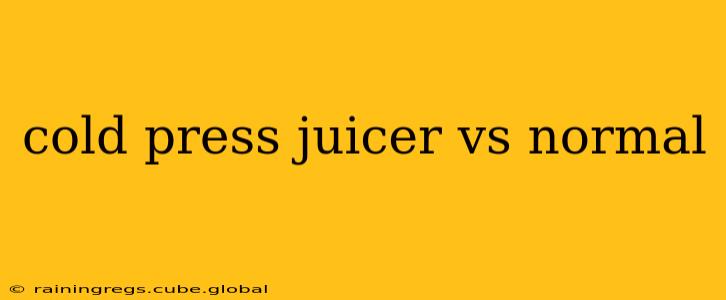Choosing between a cold-press juicer and a traditional centrifugal juicer can feel overwhelming. Both extract juice from fruits and vegetables, but their methods, resulting juice quality, and overall performance differ significantly. This comprehensive guide breaks down the key distinctions, helping you decide which juicer best suits your needs and lifestyle.
What is a Cold Press Juicer?
Cold-press juicers, also known as masticating juicers, use a slow-speed, crushing and pressing mechanism to extract juice. This gentle process minimizes oxidation and heat generation, preserving more nutrients and enzymes. Think of it as meticulously squeezing the juice out, rather than violently spinning it out.
What is a Centrifugal Juicer?
Centrifugal juicers, the more common type, use a high-speed spinning blade to shred produce and separate the juice from the pulp. This rapid process is efficient but generates heat and introduces more oxygen, potentially reducing the nutritional value and shelf life of the juice.
Cold Press Juicer vs. Normal Juicer: Key Differences
Let's delve into the core differences between these two juicing titans:
Juice Quality and Nutrient Retention:
- Cold Press: Produces juice with a higher concentration of nutrients, enzymes, and vitamins due to the slower, gentler process. The juice often has a thicker consistency and a longer shelf life.
- Centrifugal: Produces juice that's often thinner and has a shorter shelf life, as the high-speed process can degrade some of the nutrients and enzymes.
Pulp:
- Cold Press: Produces a drier pulp, indicating efficient juice extraction.
- Centrifugal: Produces a wetter pulp, suggesting some juice might be left behind.
Speed and Efficiency:
- Cold Press: Works at a slower pace, taking longer to juice the same amount of produce.
- Centrifugal: Juices quickly, making it ideal for those short on time.
Noise Level:
- Cold Press: Generally quieter than centrifugal juicers.
- Centrifugal: Can be quite noisy due to the high-speed motor.
Cleaning:
- Cold Press: Can have more parts to clean, but the process is usually straightforward.
- Centrifugal: Typically easier to clean, with fewer parts.
Price:
- Cold Press: Generally more expensive than centrifugal juicers.
- Centrifugal: More affordable and widely available.
Which Juicer Should You Choose?
The best juicer for you depends on your priorities:
- Prioritize nutrition and a longer shelf life: Opt for a cold-press juicer.
- Need speed and convenience: Choose a centrifugal juicer.
- Budget is a major concern: A centrifugal juicer is likely the more affordable option.
- You want a quieter juicing experience: A cold-press juicer will be less noisy.
Frequently Asked Questions (FAQs)
How long does cold-pressed juice last?
Cold-pressed juice generally lasts for 1-2 days when refrigerated. Its longer shelf life is attributed to the lower oxidation levels.
Is cold-pressed juice worth the extra cost?
Whether it's worth the higher price tag is subjective. If maximizing nutrient retention and enjoying a richer, longer-lasting juice is crucial to you, the extra cost might be justified.
What's the best way to clean a cold-press juicer?
Most cold-press juicers have removable parts that can be easily cleaned with warm soapy water or a dishwasher (check manufacturer instructions).
Are all cold-press juicers the same?
No, cold-press juicers vary in features, power, and efficiency. Research and compare different models before making a purchase.
Can I juice leafy greens in a cold-press juicer?
Yes, cold-press juicers are excellent at juicing leafy greens, often producing a smoother, more flavorful juice compared to centrifugal juicers.
In conclusion, the "best" juicer truly hinges on your individual needs and preferences. Carefully consider the factors outlined above to make an informed decision that aligns perfectly with your juicing goals.
